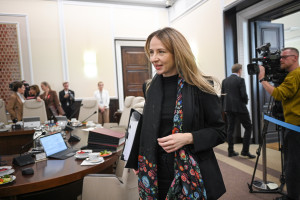District hospitals want changes. Budget for diagnostics, night and holiday care in the competence of primary care clinics

Author: prepared by JKB • Source: Rynek Zdrowia • Published: February 24, 2025 14:15
The Board of the National Association of District Hospital Employers has issued a position on the proposed systemic and organizational changes in POZ. - As the board of an organization associating over 200 district hospitals from all over Poland, we are always willing to talk and work together to repair the healthcare system in our country - indicated in the letter the vice-president of OZPSP Krzysztof Żochowski.
On behalf of the organization’s members, the Vice-President of the OZPSP, Krzysztof Żochowski, submitted several proposals for systemic and organizational changes in primary health care in a letter to the Minister of Health.
- In our opinion, their implementation may have a positive impact on improving the functioning of the healthcare system in Poland and significantly reduce the burden and streamline the operations of hospitals, thus increasing their efficiency - we read in the letter.
List of suggestions:
- OZPSP proposes that the organisation of night and holiday health care in the region should be the responsibility of the local primary health care clinics, not hospitals.
- In our opinion, it could take the form known from previous years, or be organized in a rotational manner, according to which, for example, a different clinic would be responsible for organizing NiŚOZ every month. NiŚOZ is a typical primary care product, for which family doctors should be responsible, not hospitals, which carry out other tasks - it was reported.
- However, if the system organizer does not decide to change the places of providing services within the framework of the NiŚOZ, it is necessary to create a mechanism that will oblige primary care physicians to work in the NiŚOZ in the region where their clinics operate. It is also necessary to consider eliminating the requirement to conduct laboratory tests within the NiŚOZ and increasing the flat-rate fee for conducting it, because it is currently inadequate to staff salaries and requirements.
- We appeal for the creation of financing mechanisms that will encourage primary health care clinics to properly fulfil their tasks.
We often observe that primary care physicians refer patients to hospital emergency departments or admission rooms without indications, or refuse to admit them, referring them to night and holiday health care, despite the fact that patients report during the clinic's opening hours. A mechanism should be developed to influence primary care, e.g. by introducing quality indicators of patient treatment in primary care or changing the method of financing to one that will take into account both the fee for readiness and for the health services provided - it was indicated.
- We believe that there should be more control over the time discipline of primary healthcare. In cases where primary healthcare does not provide access to services during the mandatory hours, it should conclude agreements with a neighboring clinic or the nearest hospital to replace it, and pay for this replacement.
- According to experience, a major problem is the insufficient diagnostics performed in patients within the framework of primary care, which is observed when the patient goes to a specialist as part of outpatient specialist care, often after a long waiting period for an appointment. The lack of basic tests generates the need to perform them after the visit to the AOS and further delays the treatment process, and consequently the availability of specialist care for other patients. This is an obvious example of attempts by primary care physicians to transfer the costs of diagnostics to hospitals/AOS.
The OZPSP proposes to allocate a budget for laboratory and imaging diagnostics within the primary healthcare lump sum, as well as to increase the basket of tests that family doctors can refer.
- The organization believes that in order to efficiently exchange information on the patient's health condition, local primary care clinics should be obliged to use the diagnostic database available in the appropriate district hospital, so that if it is necessary to treat a patient there, doctors will quickly have a complete set of the latest results, which will significantly improve the financial efficiency and speed of the diagnostic and therapeutic process, bringing savings for the system, but above all, it will increase patient safety.
- OZPSP fully supports the ideas aimed at developing broadly understood health prevention. It believes that with the current increase in the number of cancer cases and such lifestyle diseases as diabetes or circulatory system diseases, it is necessary to organize wide-ranging preventive examinations, the coordination of which should be taken over by primary health care. Family doctors know their patients best and often the longest, so they are able to diagnose and effectively supervise the treatment of many diseases at the earliest, so it is necessary to create systemic tools that they can use for this purpose.
- I hope that the postulates we have submitted will become an introduction to a discussion that will lead to the expected, necessary changes. As the board of OZPSP, an organization associating over 200 district hospitals from all over Poland, we are always willing to talk and work together to repair the healthcare system in our country - concluded the vice-president.
Copyrighted material - reprint rules are specified in the regulations .
rynekzdrowia












